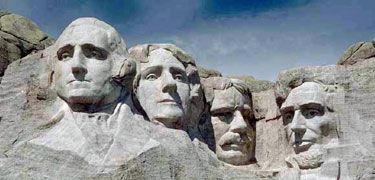 From America’s Poorest Presidents: Bankruptcy, Insolvency and Extreme Financial Hardship:
From America’s Poorest Presidents: Bankruptcy, Insolvency and Extreme Financial Hardship:
An ambitious but poor young man, Abraham Lincoln’s early life left him in financial ruin. When he was in his 20′s he bought a general store with a friend and business associate – an investment he would later regret. Before the store went bankrupt Lincoln sold his share in the venture. However, his partner died shortly afterwards and Lincoln was forced to absorb his debts. He was taken to court by the store’s creditors and lost ownership of his only remaining assets: a horse and some surveying equipment. His later career as an attorney eventually brought Lincoln out of complete poverty.
Despite an ostentatious lifestyle – or perhaps because of it – Thomas Jefferson owed money to various creditors throughout his life. He inherited debt from his father-in-law as a result of unusual estate planning and was a creditor to many unreliable debtors. His main source of income, “Monticello,” proved inadequate to cover his debts. Poor management of his estate and price fluctuations of commodities cost Jefferson dearly. Towards the end of his life, he was so severely in debt that he petitioned the state of Virginia to auction off his land; the state refused. After he died, his estate was auctioned off, and his surviving daughter was forced to rely on charity
Abraham Lincoln and Thomas Jefferson are two of the most beloved figures in American History. Their lives and accomplishments are forever enshrined in monuments in our nation’s capital; they are half the bedrock figures atop Mount Rushmore. Yet both of these men, as well as the other presidents included in the infographic The Flag of Bankrupt Presidents, were plagued by business failure and burdensome debt.
Lincoln and Jefferson understood that they could transcend their troubles and provide meaningful contributions to the nation. They would not be defeated by financial struggles. Their place in history is defined by their deeds, not their debt.
